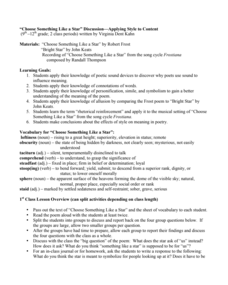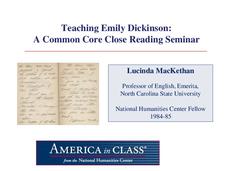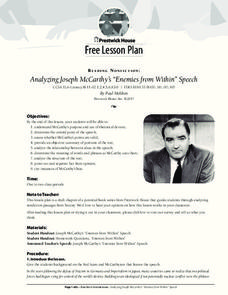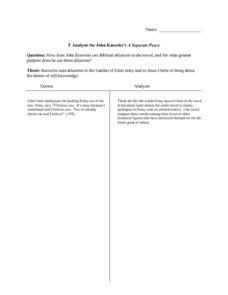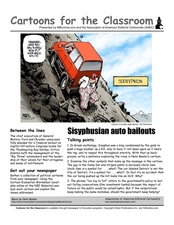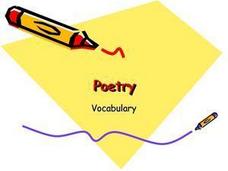EngageNY
Launching To Kill A Mockingbird: Establishing Reading Routines (Chapter 1)
Scholars use a Story Impressions Note-catcher to capture their first impressions of words or phrases from To Kill a Mockingbird. They then listen to a reading of the first six pages of the novel before the teacher asks questions to check...
Robert Frost Farm
“Choose Something Like a Star” Discussion—Applying Style to Content
Robert Frost's "Choose Something Like a Star" and John Keats' "Bright Star" provide the text for a two-part instructional activity in which class members analyze the effects of style on meaning in poetry. Randall Thompson's song cycle...
Free Library of Philadelphia
Resources for Ghost Boys
Jewell Parker Rhodes, the author of Ghost Boys, wanted to bring the historical legacy of Emmett Till and the current topic of racial prejudice into today's young readers' mindsets. Use a reading guide and set of discussion questions to...
California Federation of Chaparral Poets, Inc
Poetic Devices
Have everything you need to know about the elements of poetry with a nine-page handout. Split into four categories—word sounds, meanings, arrangement, and imagery—budding poets may reference terms, read definitions, descriptions, and...
Independence Public Library
Unmasking the Truth Behind the Red Death
"The Masque of the Red Death" provides readers with an opportunity to research and plan a presentation about a topic related to Edgar Allen Poe's classic short story.
Santa Ana Unified School District
Early American Poets
The poems of Walt Whitman and Emily Dickinson are the focus of a unit that asks readers to consider how an artist's life and changes in society influences his or her work. After careful study of Whitman's and Dickinson's perspectives on...
National Humanities Center
Teaching Emily Dickinson: A Common Core Close Reading Seminar
Three of Emily Dickinson's poems, "I like to see it," "Because I could not stop for Death," and "We grow accustomed to the Dark," provide instructors with an opportunity to model for class members how to use close reading strategies to...
Prestwick House
Reading Nonfiction: Analyzing Joseph McCarthy's "Enemies from Within" Speech
Looking for a lesson plan that teaches class members how to analyze nonfiction? Use Joseph McCarthy's famous "Enemies from Within" speech as a instructional text. Worksheet questions direct readers' attention to the many historical...
K12 Reader
Elegy for Lincoln: Walt Whitman’s Poem
Walt Whitman's "O Captain! My Captain!" is one of the most famous and emotional tributes to Abraham Lincoln. Guide readers through the evocative elegy with a reading comprehension worksheet, complete with the poem's text and a photograph...
Novelinks
The Graveyard Book: Concept Analysis
Neil Gaiman's award winning children's fantasy novel, The Graveyard Book, is the focus of a literary analysis overview. Those new to the novel can decide whether the book is appropriate for whole-class discussion or as a book circle...
Curated OER
Hatchet: Concept Analysis
Take an in-depth look into Gary Paulsen's Hatchet with a concept guide. With a list and explanation of thematic motifs, types of conflicts, and vocabulary in the novel, learners will engage with the text in a whole new way.
Curated OER
Figurative Language Project
Want a handy way to remember the difference between metaphors and similes, or allusions and alliteration? Individuals craft their own figurative language booklet, complete with definitions, examples, and illustrations, following...
Curated OER
It's All an Allusion: Identifying Allusions, in Literature and in Life
To allude, or not to allude, that is the question: whether ‘tis better to make a reference and engage your audience or risk confusing them or sounding dated. After reading an article about, and loaded with allusions, class members take a...
Curated OER
Literary Terms
Seriously, 93 slides of literary terms? Yes, and well worth the time, although perhaps not all at once. The beauty here is in the concise, easy-to-understand definitions for such well-known terms as imagery and personification, as well...
Curated OER
A Separate Peace - T Analysis
Reading A Separate Peace? Readers analyze important quotes that appear in John Knowle's classic novel using the provided graphic organizer. Learners record a passage and provide an accompanying analysis for each entry. Consider having...
Curated OER
Elements of Poetry
Prepare your learners to identify figurative language in poetry. Tips for reading poetry and what to look for are listed on these slides. Rhetorical devices are defined and plenty of examples are given.
Curated OER
Cartoons for the Classroom
Political cartoons have been used to decades. What do they symbolize? Why use a political cartoon instead of an editorial piece? Look at the two political cartoons illustrated here and analyze them as a class or in pairs. Consider...
Curated OER
"Big Three" Bailouts
What does your class think about big business bailouts by the U.S. Government? Find out with this activity, where learners analyze a political cartoon comparing the "Big Three" automakers with the Greek Myth of Sisyphus. Background...
Curated OER
Borrowing from the Greek Debt
Use political cartoons to help your class understand the European Debt Crisis and visual symbolism. This analysis handout includes two cartoons depicting the crisis and prompts learners to consider possible symbols and allusions to best...
Curated OER
Cartoons for the Classroom: Obama as the New Sisyphus
Reveal how Greek Mythology can play into American politics through this political cartoon, where President Obama is depicted as Sisyphus. Background information gives scholars access to the cartoon's context, and three talking points...
Curated OER
Figurative Language
What is figurative language, and why do we use it? Introduce your high schoolers to some examples and discuss the importance of including this element in your writing. After studying a text and searching for examples, writers will...
Curated OER
Allusion in Poetry
Emerging writers identify allusion in poetry by listening to recorded poems, like Anyone Lived in a Pretty How Town. They also discuss what makes writing satirical and how writers use allusions to make satirical points.
Curated OER
Poetry Vocabulary
Consisting of a thorough and straightforward list of poetry terminology, the first part of this presentation would be a good introduction to a poetry unit, or a review for an upcoming poetry project. The list of terms is quite extensive,...
Curated OER
Reading Poetry
Present your class with an overview of poetry-related information. The slides are clearly organized by topic, starting with reading poetry, ending with myths, and touching on everything from the five senses to open and closed forms of...



